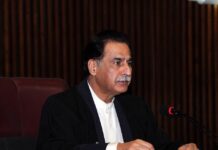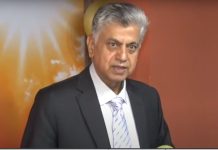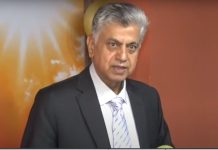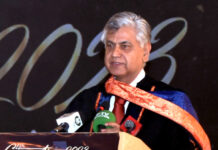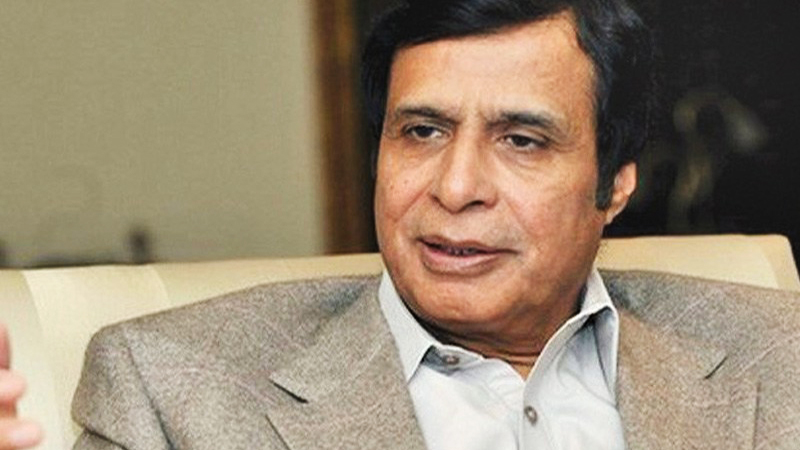
Pakistan Muslim League-Nawaz’s (PML-N) lawmakers argued that the role of Punjab governor in the capacity of the said authority’s patron-in-chief would be considered an encroachment in the powers of Chief Minister. They regarded CM as the chief executive of the province who was given all executive powers under the 18th amendment, and therefore, the Governor could not become its Patron-in-Chief.
As per the details, the government took ‘The Punjab Aab-e-Pak Authority Bill’ on Thursday for its passage by suspending the rules, which was opposed by the opposition and termed as being against the parliamentary norms of the House.
Speaking on the occasion, PML-N’s Malik Ahmed Khan claimed that it would set a wrong precedent to legislate by suspending the rules of the House in haste and the government could bring the bill on some other day.
Speaker Chaudhry Pervaiz Elahi sarcastically responded that such precedents were available in the House and he knew very well what had happened here in the last ten years.
To which Member of Provincial Assembly (MPA) Malik said, “I asked the then law minister during the last tenure not to suspend the rules for legislation and many lawmakers of the government who used to sit on the opposition benches at that time will also endorse me.”
The speaker replied that no one had dared differ with the then law minister.
PML-N’s seasoned MPA Samiullah Khan said, “If the Governor Punjab is made as the Patron-in-Chief of any authority then it would open a new Pandora’s Box as the government will have to make certain amendments in the rules of business of both the Punjab Assembly and Government of Punjab for legalizing the role of Governor.”
MPA Samiullah further added that the CM, not the Governor, would be answerable to the people after five years and this bill would open the way for encroachment in the authority of the Chief Executive.
No question or resolution could be submitted regarding the activities of Governor according to the rule 116 of the Rules of Procedure of Punjab Assembly, he further added.
PML-N’s lawmaker also argued that no MPA could talk in this House to Governor as per rules 202 (b) of Punjab Assembly.
Referring to the bill, he wondered, “If an MPA can ask a question from the law minister or even from the leader of the House then he can also ask question to the Governor Punjab because he will be working as the Patron-in-Chief of one of the most important authorities after the passage of the bill.”
The government, he believed, would have to amend all laws and constitution-related books if Governor was made the Patron-in-Chief while noting that Chaudhry Sarwar had also served as Punjab Governor during the last government of PML-N. He continued to recall that some media reports had then disclosed that the governor had then developed some differences with the PML-N because he wanted to head the water filtration project, largely due to his close friend’s association with the business of filtration plants.
“The foundation of a major scandal is being laid today through this project and it will remain unclear that who is running the affairs of the province; CM or the Governor,” he warned.
PML-N’s Khalil Tahir Sandhu also raised objections on the role of Governor in the authority and said that if Chaudhry Sarwar was interested in doing politics, he should have come and sat in this House. Addressing the Speaker, he said, “You were right when you once asked senior PTI leader Jehangir Tareen to control Chaudhry Sarwar from interfering in the domain of Chief Minister Punjab.”
Speaker Elahi directed to expunge these remarks from the proceedings. Another PMLN MPA, Azma Bokhari, asserted that the role of governor in the authority was unconstitutional and unlawful and therefore she would challenge it in the court. She called it an insult to the elected representatives, who had come to this House with the mandate of the people, whereas a non-elected person would encroach the domain of the chief executive, who is an elected representative.
Later, speaking on the bill, Punjab law minister, Raja Basharat, said that the role of Governor was being made controversial by the members of opposition while there was nothing wrong with the bill. He told the House that all the affairs of the authority would be run by the governing body and the executive authority rested with this body.
He added, “If Governor Punjab can become the chancellor of hundreds of universities then what is wrong if he becomes the Patron-in-Chief of an authority.”
The government passed the bill with a majority in the absence of the opposition, who staged a walkout as a protest in the House.
The approved bill said that the governing body shall consist of nine members, including the chairman, and the chairman shall be appointed for three years by the government in consultation with the Patron-in-Chief (Governor Punjab). Secretary Planning & Development, Secretary Finance, Secretary Local Government and Secretary Housing, Urban Development and Public Health Engineering will work as the Ex-officio members of the Governing Body.
Later, the session was prorogued for an indefinite time period.
Published in Daily Times, March 15th 2019.

